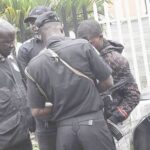INEC And Electoral Act 2022: Operational Challenges And Emerging Risks
By Barr. Festus Okoye
Introduction
LAGOS MMARCH 17TH (NEWSRANGERS)-On the 25th day of February 2020 the President of the Federal Republic of Nigeria assented to the Bill for an Act to repeal the Electoral Act No. 6 2010 and enact Electoral Act, 2022, to regulate the conduct of the Federal, State and Area Council in the Federal Capital Territory elections, and for related matters.
On the 26th day of February 2022, the Independent National Electoral Commission (INEC) released the Timetable and Schedule of Activities for the conduct of the 2023 general elections. The Commission fixed February 18, 2023 as the date for the Presidential and National Assembly Elections and March 11, 2023 as the date for the conduct of Governorship and State Assembly elections. Consequently, the 2023 general election will be conducted using the Constitution of the Federal Republic of Nigeria, 1999(as amended); the Electoral Act, 2022; the Regulations, Guidelines and manuals developed by the Commission pursuant to the new Electoral Act, 2022.
The Commission learnt valuable lessons from the 2019 general election. The Commission also analyzed the election and came to terms with some of the challenges of the said election and the subsequent off-season and bye-elections. The Commission has also designed strategies and mechanisms of overcoming some of the identified challenges.
- The Challenge of Voters Register
The Commission has embarked on the Continuous Voter Registration (“CVR”) Exercise. There are so many communities that are still inaccessible to our registration officers. The Commission has further devolved the CVR to our registration areas on a rotational basis. The Commission is determined to register all eligible registrants but will not expose its staff to unnecessary danger. The Commission will roll out and roll back depending on the security situation in different parts of the country. However, the issue of multiple and double registration has been a huge challenge in the Commission.
- Multiple Registrants
Those that have lost their Permanent Voters Cards (“PVCs”), rather than apply for a new one, “ignorantly” register afresh in violation of the law. Those with PVCs that are defaced or damaged simply apply for new ones. Some that are on transfer or want to transfer their voting locations simply apply for a new one. All these are in violation of the law and the Commission does not have the capacity to prosecute all the violators and I am sure that the country does not have enough correctional facilities to house the large number of violators.
- Lack of an organized database of births and deaths
Nigeria does not have a reliable data of births and deaths. Furthermore, Nigerians are sometimes unwilling to come forward and provide information on deaths. While it is easy to use newspaper obituaries to delete the names of prominent people who are deceased, it is next to impossibility for the Commission to do a thorough job without a reliable data of deaths and births.
- Operational Challenges Relating to Technology
Rolling out a new technology has its own challenges. As some of you are aware, the Commission has introduced new and creative changes in the enumeration of voters; the party nomination processes and the conduct of elections. The Commission is currently conducting the CVR both physically and online using the new INEC Voter Enrolment Device (“the IVED”). The Commission has introduced an online nomination portal through which Political Parties upload the list and personal particulars of their nominated candidates.
The Commission has also introduced an online portal through which international and domestic observers and the media apply for accreditation. The Commission introduced the INEC Result Viewing Portal (iRev) through which polling unit level results are uploaded to a result viewing portal in real time. The Commission has also introduced the Bimodal Voter Accreditation System (“the BVAS”) for voter accreditation and authentication. The Commission is firmly of the view that greater use of technology in the electoral process will to a large extent reduce human interference in the voting, counting and collation process.
Sections 47(2) of the Electoral Act secures the place of the Smart Card Reader or other Technological Device in the Electoral Process while section 50(2) of the Act gives the Commission the discretion to determine the mode of voting and transmission of results. The Commission had setbacks with the BVAS during the Anambra Governorship election and the FCT Area Council Elections and the BVAS performed well during the 6 bye-elections conducted by the Commission in four States of the Federation on the 26th day of February 2022.
However, the Commission is conscious of the fact that technology does not operate itself and that the human element is ever present. The Commission will continue to learn from issues and challenges that arise from the deployment of technology and will continue to innovate and improve on them.
The Commission acknowledges the fact that the BVAS did not perform optimally in the FCT Area Council election and took all the criticisms on board and made necessary corrections and adjustments. This accounts for the optimal performance of the BVAS in the six bye-elections conducted by the Commission in four states of the Federation on the 26th of February 2022.
The Commission will continue to use the BVAS to verify, confirm or authenticate the particulars of an intending voter. The BVAS is the new enemy of those engaged in identity theft and multiple voting as it verifies either the finger print or facial of the intending voter. Those that warehoused PVCs, the Consultants and Middlemen that design how to undermine the electoral process and those that hawk and distribute PVCs are now canvassing for the return to incident forms and manual voting.
The Commission will not travel backwards but will continue to improve on its technological base and innovations. The Commission will continue to work with security agencies to protect our equipment and personnel. With the BVAS and the uploading of polling unit level results, violence has left the Collation Centers and reverted back to the polling units.
The Commission will expand the base of the training of its ad-hoc staff to acquaint them more with the workings of the BVAS and other technological innovations of the Commission.
The Question of Logistics
The Commission is designing a new template on the issue of logistics. During the 2019 general election, the Commission deployed over a million ad-hoc staff. These ad-hoc staff and the Permanent Staff of the Commission must be moved from the State Offices to the Local Government Offices and to the Registration Area Centers and to the Polling Units. The Commission must also engage in reverse logistics.
Getting the Presiding Officer and the ad-hoc staff to the Collation Centers on Election Day remains a huge challenge. Some of the transporters fail to turn up for reverse logistics. Some of the security agents at the Polling Unit simply walk away on account of transportation challenges. The Polling Agents of Political Parties sometimes hold the ad-hoc staff hostage and the moment it is nightfall everybody gets desperate and getting the personnel and materials to the collation center becomes a huge challenge.
The Commission will engage the various transport unions and the security agencies on the issue of movement of personnel and materials to the various centers on Election Day. The Commission is determined to reverse the challenge of logistics and open the polls on time to enable Nigerians have a good voting experience.
Deployment and Provision of Security
Section 27(3) of the Act gives the Commission the responsibility of requesting for the deployment of relevant security personnel necessary for elections and shall assign them in the manner determined by the Commission in consultation with relevant security agencies. Deployed security agencies are to report to the various Registration Area Centers and accompany the personnel and materials to the polling units on Election Day. Sometimes the security personnel go directly to the Polling Units without giving the necessary security cover to the materials and personnel and this delays deployment.
Sometimes, some Divisional Police Officers insist on conducting parade before deployment and this may delay deployment. The Commission is addressing these issues under the auspices of the Inter Agency Consultative Committee on election security. The Commission is also addressing the huge issue of transporting a large cache of security personnel on Election Day.
Sometimes the Registration Area Collation Centers are vulnerable and the security agencies are unable to provide the requisite security and it posses its own challenge.
Sometimes attempts at moving collation to a more security collation results in violent reactions.
Operational Challenges Relating to Training
The Regulations, Guidelines and Manuals are based on the Electoral Act, 2010(as amended). The Commission must redraft the Regulations, Guidelines and Manuals. The documents must be made available to the Political Parties, Civil Society Groups and Organizations and staff of the Commission as well as the ad-hoc staff that will be recruited by the Commission. These categories of persons must master them and use them for the conduct of elections.
Political Parties refusing to comply with the provisions of the law
The third Schedule to the Constitution and section 82 of the Act established the Commission as the regulator of political parties, their organization and operations. It makes it mandatory for the Commission to monitor the Conventions, Congresses, Primaries and meetings of the Commission. The Commission can monitor and report on these activities whether invited or not. Section 84(4) (a) & (b) of the Act makes it mandatory for the Commission to monitor direct primaries of political parties in the 8,809 Electoral wards of the country. It is not clear whether the doctrine of substantial compliance will apply when parties have issues in a few or substantial number of wards in the conduct of primaries. Section 77(2) &(3) of the Act makes it mandatory that every registered political party shall maintain a register of its members in both hard and soft copy and make such register available to the Commission not later than 30 days before the date fixed for the party primaries, congresses or convention.
The question is what happens if a political party fails to conduct valid primaries and does not make the register available to the Commission at the stipulated time? By the provisions of section 84(13) of the Act in the event of such an eventuality where a political party fails to comply with the provisions of the Act in the conduct of its primaries, its candidate for election shall not be included in the election for the particular position in issue. It is not clear whether it is the Commission or the Courts that will play the role of giving effect to the provision of section 84(13) of the Act.
Deployment of Polling Agents
Section 43(1) of the Act provides that each Political Party, in consultation with its candidate, may by notice in writing addressed to the Resident Electoral Commissioner of the State, appoint a polling agent for each polling unit and collation centre in the Local Government Area and Area Council for which it has candidate and the notice, which sets out the name, address and contact details of the polling agent, shall be accompanied by two passport photographs of each polling agent and sample signature of the polling agent and be given to the electoral officer at least 14 days before the date fixed for the election. Some of the Political Parties deliberately refuse to comply with this provision. The Commission prints tags and distributes to the political parties for the benefit of those whose names have been uploaded in the Commissions portal.
Some Political parties print their own accreditation tags and deploy some of their Polling Agents and Thugs to the Polling Units. Sometimes there are fights of dominance and precedence. Political Parties also refuse to make transportation arrangements for their agents and the agents end up fighting with staff of the Commission on access to vehicles exclusively meant for staff of the Commission and security agencies. Political Parties must realize that the Presiding Officer has full mandate to remove any trouble maker from the polling unit and the security agencies will be properly advised on this. Political parties must make separate arrangements for their own agents independent of that of the Commission.
Visually Impaired and Incapacitated Voters
Section 54(2) of the Act mandates the Commission to take reasonable steps to ensure that persons with disabilities, special needs and vulnerable persons are assisted at the polling place by the provision of suitable means of communication, such as Braille, Large embossed print, electronic devices, sign language interpretation, or off-site voting in appropriate cases. Unfortunately, collecting data relating to clusters of persons with disability has been difficult. The Commission has through its Gender and Inclusivity Desk been relating to the various associations of persons with disability to collect data for purposes of deploying assistive materials appropriately and strategically to the polling units. The situation will definitely improve because even before the new Electoral Act 2022, the Commission has been collecting desegregated data of persons with disability in the CVR.
Operational Issues relating to the Transfer of Results
Legally and semantically, there may be a difference between the transmission of results and the transfer of results. Section 50(2) of the Act gives the Commission the discretion to determine the mode of transmission of results. Section 51(2) of the Act elevates accredited voters over the number of voters in the Voters’ Register as the dominant procedure for determining over voting in an election.
However, the Law retains the manual collation of results. By section 60 of the Act, the Presiding Officer shall, after counting the votes at the polling unit, enter the votes scored by each candidate in a form to be prescribed by the Commission as the case may be. The presiding officer shall transfer the result including total number of accredited voters and the results of the ballot in a manner prescribed by the Commission.
By section 62(1) of the Act, after the recording and announcement of the result, the presiding officer shall deliver same along with election materials under security and accompanied by the candidates or their polling agents, where available, to such person as may be prescribed by the Commission.
By section 64(4) of the Act, a collation officer or returning officer at an election shall collate and announce the result of an election, subject to his or her verification and confirmation that the number of accredited voters stated on the collated result are correct and consistent with the number of accredited voters recorded and transmitted directly from polling units under section 47(2) of this Act. Where during collation of results, there is a dispute regarding a collated result or the result of an election from any polling unit, the collation officer or returning officer shall use the following to determine the correctness of the disputed result-
(a) the original of the disputed collated result for each polling unit where the election is disputed;
(b) the smart card reader or other technology device used for accreditation of voters in each polling unit where the election is disputed for the purpose of obtaining accreditation data directly from the smart card reader or technology device;
(c) data of accreditation recorded and transmitted directly from each polling unit where the election is disputed as prescribed under section 47(2) of this Act; and
(d) the votes and result of the election recorded and transmitted directly from each polling unit where the election is disputed, as prescribed under section 60(4) of this Act.
Balancing the Distribution of Polling Units
Nigeria went into the 2019 general election with 119, 974 Polling Units created in 1996. In 2021, the Commission created 56, 872 additional polling units bringing the total number of polling units in Nigeria to 176, 846. The Commission decongested and dispersed some of the polling units and relocated those in inappropriate locations. Populating the newly created polling units is a huge challenge.
Some of the newly created polling units have zero voters while others have up to 5,000 registered voters. The Commission is working hard to balance these polling units.
Movement of Staff and Materials and Reverse Logistics
The Commission has a Memorandum of understanding with the National Union of Road Transport Workers and the National Association of Road Transport Owners and their drivers for the movement of Staff and Materials to the Local Governments, registration Areas and the Polling Units. In the same vein, they are to reverse the logistics at the end of voting. Breach of contract, insecurity and other issues conspire to render the movement problematic.
Increasing Number of Internally Displaced Persons(“IDPs”)
The 2023 general elections will come with challenges and the Commission is determined to surmount these challenges and conduct free, fair, credible and inclusive election. Growing insecurity in several parts of the country and the increasing number of IDPs will pose the biggest challenge to the conduct of the 2023 general election. So many of the IDPs are in the houses of friends and relatives and have lost their PVCs and it is next to impossibility to recreate their polling units. This is because section 47(1) of the Electoral Act clearly provides that “A person intending to vote in an election shall present himself with his PVC to a Presiding Officer for accreditation at the polling unit in the constituency in which his name is registered.” These persons are no longer in their constituencies and can no longer access their polling units and so many of them have lost their PVCs. While it is easy to recreate constituencies and polling units in clustered Camps of IDPs, it is next to impossibility to do so for persons staying in scattered locations. For the internally displaced, the Commission will print new PVCs for them and recreate their polling units in their camps and they will be eligible to vote in some of the elections depending on their location and their proximity to their State and Federal Constituencies. This is in accord with section 24(1) of the Electoral Act which provides that “In the event of an emergency affecting an election, the Commission shall, as far as practicable, ensure that persons displaced as a result of the emergency are not disenfranchised”.
Based on this, the Commission developed regulations and guidelines on IDP voting and will implement the intendment of the law and its Regulations and Guidelines.
Deficit of Infrastructure
The Commission deploys generators to its Registration Area Centers. It deploys GP Tanks, buckets, mats and toiletries to these places because of infrastructural deficit. Some of the schools and public places used as polling units and Registration Area Collation Centers are in a very terrible state. The Commission will supply a comprehensive list of these schools and public places to the Local and State Governments for remedial action. By section 25 of the Electoral Act, the results of all the elections shall be announced by the Presiding Officer at the polling unit; the Ward Collation Officer at the Registration Area or Ward Collation Centre; and the Local Government or Area Council Collation Officer at the Local Government.
The Determination of Pre-Election Matters
Prior to the coming into force of the Electoral Act, 2022, the Electoral Act, 2010(as amended) vests jurisdiction in the determination of pre-election matters in the High Courts, High Court of the Federal Capital Territory and the Federal High Court. Unfortunately, some litigants abused the substantive and geographical jurisdiction of the Courts by engaging in Forum Shopping. The Electoral Act, 2022 gives the Federal High Court exclusive jurisdiction to hear and determine pre-election matters. There remains the challenge of candidates and their parties travelling to far distances to file matters since the Commission is a federal agency and has offices in all the Local Governments in Nigeria and in all the States of the Federation. The Chief Judge of the Federal High Court must stem the epidemic of Forum Shopping through the issuance of a Practice Direction that domiciles cases in the jurisdiction where the cause of action arose.
Emerging Risks
Technology is the new enemy.
With the introduction of the BVAS as the dominant means of accreditation, the Commission has recorded incidents of stealing, smashing or destruction of the BVAS. The BVAS is the new enemy of those that inflate election results and simply tick the voters register. We have recorded incidents of abduction of Presiding Officers and their being forced to query the BVAS and replacing already thump printed ballot papers with fake ones. There is the risk of power failure leading to the non-charging of the BVAS or deliberate sabotage of the BVAS.
Some of the properly and duly trained ad-hoc staff may not turn up on election day; necessitating their being replaced with those not fully and properly trained.
Decisions of Returning Officers on Declarations and Returns
Section 65(1)of the Electoral Act makes the decision of the Returning Officer on issues relating to the declaration of the scores of candidates and the return of candidates final with a proviso that the Commission shall have the power within seven days to review the declaration and return where the Commission determines that the said declaration and return was not made voluntarily or was made contrary to the provisions of the law, regulations and guidelines, and manual for the election. This section restores the primacy of the Commission and subjects all those contracted or employed by the Commission to its suzerainty and supervision. It may also expose staff of the Commission to risks as some of the candidates and the parties may target those that give information that leads to review of declarations and returns.
Conclusion
The Electoral 2022 came into force on the 25th of February 2022. The law has not been tested. No election has been conducted under the said law and there is no judicial pronouncement on any of the sections.
As we move towards the Ekiti and Osun States Governorship elections later this year, issues may emerge that may be the litmus test. But the Commission will continue to take steps to address issues and challenges as they emerge.
Presented by Barrister Festus Okoye, National Commissioner &
Chairman, Information and Voter Education Committee, Independent National Electoral Commission, at a workshop for selected journalists, organised by the Konrad Adenauer Stiftung organisation, at Well Carlton, Abuja on 16th March 2022.
Short URL: https://newsrangers.com/?p=85055

































